The Reading Chinese Book Review Network Residential Weekend
Written by Halima Chen
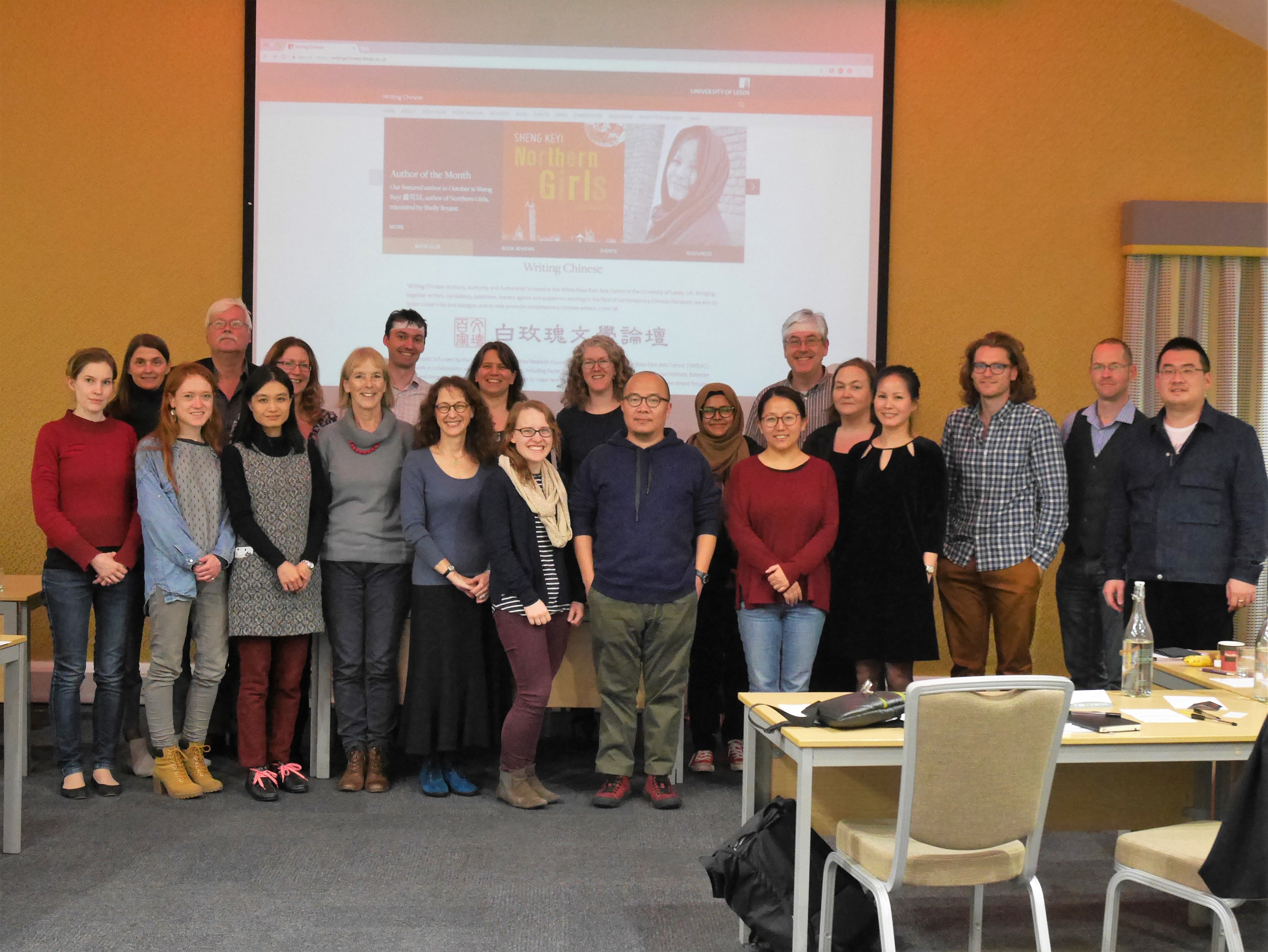
"Meeting authors and translators gave me an additional window into the literature. I was encouraged to read more widely and think about doing some translation. We do need to be creative in commending this literature to a broader reading public and Writing Chinese and the workshop are crucial in this regard."
We recently held the first of our two Book Review Network residential events, made possible by the generous support of the Arts and Humanities Research Council. Ten reviewers and eight speakers and invited guests attended the book discussion weekend, on 11 and 12 November 2017, at Weetwood Hall Hotel and Conference Centre in Leeds. The discussion focussed on four books by contemporary Chinese writers that all participants had read in advance, as well as speaker-led sessions on Women in China: in writing, as writers and in real life; Hong Kong literature: in particular the surreal; Chinese writing for children; and the craft of writing reviews of translated literature.
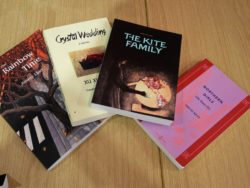 The aims of the weekend were primarily to talk about and also to generate discussion questions in both English and Chinese for four books: Northern Girls by Sheng Keyi, translated by Shelly Bryant (Penguin, 2015); Crystal Wedding by Xu Xiaobin, translated by Nicky Harman (Balestier Press, 2016); The Kite Family by Hon Lai-chu, translated by Andrea Lingenfelter (Muse, East Slope Publishing, 2015); and The Rainbow of Time by Jimmy Liao, translated by Wang Xinlin and Andrea Lingenfelter (Balestier Press, forthcoming). The discussion questions produced at the weekend will be shared with publishers and will be posted on the Writing Chinese website for anyone who might be interested in using one of the featured books in a book club discussion. In addition, all the book review network reviewers who attended the event are providing a full review of each of the four books. These will be shared with authors, translators and publishers, and also posted on the book review section of our site.
The aims of the weekend were primarily to talk about and also to generate discussion questions in both English and Chinese for four books: Northern Girls by Sheng Keyi, translated by Shelly Bryant (Penguin, 2015); Crystal Wedding by Xu Xiaobin, translated by Nicky Harman (Balestier Press, 2016); The Kite Family by Hon Lai-chu, translated by Andrea Lingenfelter (Muse, East Slope Publishing, 2015); and The Rainbow of Time by Jimmy Liao, translated by Wang Xinlin and Andrea Lingenfelter (Balestier Press, forthcoming). The discussion questions produced at the weekend will be shared with publishers and will be posted on the Writing Chinese website for anyone who might be interested in using one of the featured books in a book club discussion. In addition, all the book review network reviewers who attended the event are providing a full review of each of the four books. These will be shared with authors, translators and publishers, and also posted on the book review section of our site.
As well as providing a forum for reviewers to discuss the featured novels and short story collection with each other, the weekend also gave the reviewers a chance to talk directly to one of the books’ authors (Northern Girls author Sheng Keyi) and two of the books’ translators (Andrea Lingenfelter and Nicky Harman) about the process of writing, and the unique challenges faced when rendering these works into English. Other guest speakers at the event were editor and film-maker Ou Ning, and Chinese literary translators Helen Wang, Michelle Deeter and Nick Stember, who also provided fascinating insights into their work of translating contemporary Chinese writers and bringing their work to non-Chinese audiences.
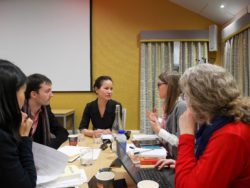 "Meeting authors and translators gave me a better understanding of the books, and of translated literature in general. The discussions and panels introduced me to several more Chinese authors and books, which both helped contextualise the books we have been reading and gave me ideas of what to read next."
"Meeting authors and translators gave me a better understanding of the books, and of translated literature in general. The discussions and panels introduced me to several more Chinese authors and books, which both helped contextualise the books we have been reading and gave me ideas of what to read next."
The weekend began with a short talk by one of China’s newer generations of writers who deal primarily with modern, urban China. Sheng Keyi said that Northern Girls, her first full-length novel, was born of the multitude of questions that she had even as a young girl growing up in the Hunan countryside and witnessing the inequalities faced by women and peasant farmers: why did the government take all the grain her parents grew when her family did not have enough food to eat? Why, after marriage and the birth of their first child, were women dragged to the local hospital and forced to undergo sterilisation, as part of the “barbaric” one-child policy? She said that she had the female protagonist of her novel frame her questions about the way China treats women, migrant workers and the rural poor.
Then, Crystal Wedding translator Nicky Harman talked about author Xu Xiaobin and what her novel, which has never been published in the Chinese-speaking world, tells readers about Chinese women’s lives. She said that there were several threads that jumped out in the novel: the pressure on women to marry and produce sons, the sexual ignorance of some Chinese women in the 1960s and ‘70s, the lack of recognition for and sometimes outright discrimination against women artists and writers, and Xu’s thinly veiled criticism of political corruption. Although the book is “not a bundle of laughs,” Nicky said that, while translating it, she found a depth of emotion in the many powerful passages and bitterly personal anecdotes.
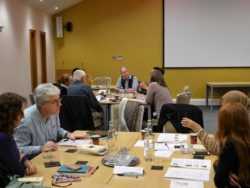 "The diversity of perspectives made for refreshing and lively discussions."
"The diversity of perspectives made for refreshing and lively discussions."
Later in the day, Nicky, Andrea and award-winning translator Helen Wang shared their tips for how to write a good review. They suggested that, when reviewing Chinese literature in translation, it is important to be aware of who you are writing the review for and to briefly contextualise the author and social or historical context of the work. Reviewers are not expected to comment on the quality of the translation unless they are qualified to do so (if they have read both the original and the translated works), but they should always mention the translator, they said. Reviewers should have a point of view and not be afraid to put their personality into their reviews. They encouraged the reviewers to read other reviews for ideas on how to approach the process of review-writing, and reminded them to be thoughtful and critical, giving examples to back up what they are saying. Reviews are important guide posts to bring English-speaking audiences to Chinese fiction, they said.
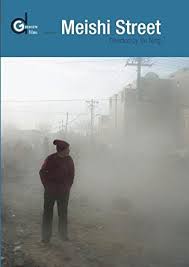 In the evening, participants were treated to a special screening of Meishi Jie, a documentary film by visual artist Ou Ning, which shows ordinary Chinese citizens taking a stand against the government destruction of their homes and businesses for the 2008 Beijing Olympic games. After the screening, at the Everyman Cinema in Leeds city centre, Ou Ning talked about how it was filmed. He said that the filmmakers gave some of the evictees video cameras to tell their story and shoot exclusive footage of the eviction and demolition process.
In the evening, participants were treated to a special screening of Meishi Jie, a documentary film by visual artist Ou Ning, which shows ordinary Chinese citizens taking a stand against the government destruction of their homes and businesses for the 2008 Beijing Olympic games. After the screening, at the Everyman Cinema in Leeds city centre, Ou Ning talked about how it was filmed. He said that the filmmakers gave some of the evictees video cameras to tell their story and shoot exclusive footage of the eviction and demolition process.
On day two, Andrea Lingenfelter and Nicky Harman talked about Hong Kong literature, and in particular the surreal work of two female authors, Dorothy Tse and Hon Lai-chu. They talked about the peculiar problems of translating surreal fiction, especially when the author is inventing places and words. The translator's main fear could be summed up, they said, in getting the cadence or feel wrong. The aim was for the translator to notice the clues laid out by the author and to keep the surreal surreal in the translation, they observed. Discussion centred on other mainland Chinese and Taiwanese authors who had influenced Tse and Hon’s work, including experimental writer and poet Xi Xi, as well as Hong Kong’s unique position in terms of its history and identity, and the specific translation issues raised by translating from Cantonese rather than standard mandarin Chinese.
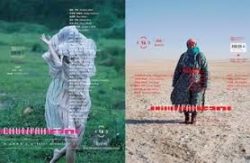 In the afternoon, Ou Ning talked about the innovative, bimonthly Chinese-language literary journal Chutzpah! In the 16 issues published between 2011 and 2014, the journal brought writing by minorities and people from outside Chinese society together on specific topics, including Agrarian Asia, Mapping Poetry, The Diaspora, Revolutions, etc. Although the now-defunct magazine was published in Chinese, it was accompanied by an English-language supplement, Peregrine, in collaboration with the translators cooperative, Paper Republic, featuring translations of popular stories as a platform for promoting Chinese-language writing in English.
In the afternoon, Ou Ning talked about the innovative, bimonthly Chinese-language literary journal Chutzpah! In the 16 issues published between 2011 and 2014, the journal brought writing by minorities and people from outside Chinese society together on specific topics, including Agrarian Asia, Mapping Poetry, The Diaspora, Revolutions, etc. Although the now-defunct magazine was published in Chinese, it was accompanied by an English-language supplement, Peregrine, in collaboration with the translators cooperative, Paper Republic, featuring translations of popular stories as a platform for promoting Chinese-language writing in English.
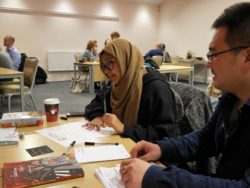 In the session about children’s literature, which preceded discussion of The Rainbow of Time, Helen Wang and Andrea talked about how they resolved the perennial dilemma of how to translate names. They stated that a direct pinyin translation of the name from the Chinese was not always helpful to someone who had no knowledge of Chinese, so for children’s books a more direct transliteration of what the Chinese name sounded like was sometimes more appropriate. Andrea suggested that sometimes a better alternative was to find Western names that mirrored the meanings suggested by the Chinese, an approach that she had adopted when translating The Kite Family. Helen asked reviewers what they thought about the common practice in Chinese children’s book publishing of including a paratext – an explanation of how the book might be used by parents or teachers. The general feeling was that these might be useful to some readers and not to others and that it was better to leave them in, as people could choose to ignore them if they wanted to.
In the session about children’s literature, which preceded discussion of The Rainbow of Time, Helen Wang and Andrea talked about how they resolved the perennial dilemma of how to translate names. They stated that a direct pinyin translation of the name from the Chinese was not always helpful to someone who had no knowledge of Chinese, so for children’s books a more direct transliteration of what the Chinese name sounded like was sometimes more appropriate. Andrea suggested that sometimes a better alternative was to find Western names that mirrored the meanings suggested by the Chinese, an approach that she had adopted when translating The Kite Family. Helen asked reviewers what they thought about the common practice in Chinese children’s book publishing of including a paratext – an explanation of how the book might be used by parents or teachers. The general feeling was that these might be useful to some readers and not to others and that it was better to leave them in, as people could choose to ignore them if they wanted to.
Finally, the day was rounded off with a discussion of what was next for the project. Watch this space for news of some exciting new developments!
The residential weekend and the Reading Chinese Book Review Network have been made possible through the generous support of our funder, the Arts and Humanities Research Council (AHRC), and our publishing partners, Penguin Random House North Asia and Balestier Press, as well as Muse, who have kindly provided the books for review. If you'd like to find out more about joining our network, you can find out more here.
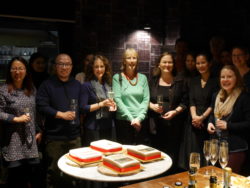
Some of our wonderful guests. (L-R) Interpreter Zhang Jianan, Ou Ning, Andrea Lingenfelter, Nicky Harman, Helen Wang, Sheng Keyi, and Michelle Deeter.
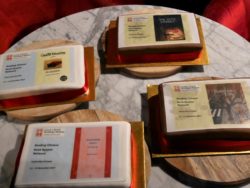
Special cakes, decorated with the books we discussed at the weekend! (There was very little left after the event....)
